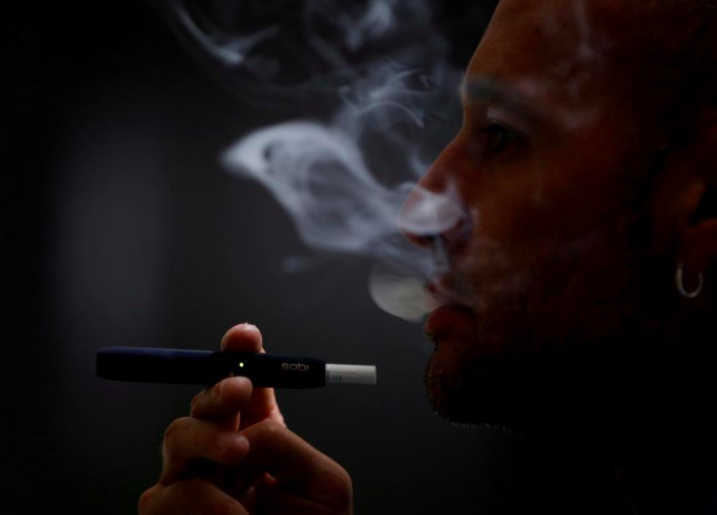
A man prepares a tobacco stick for use in an iQOS e-cigarette at an outlet in London, Britain, January 25, 2018. Credit: Reuters/Peter Nicholls
Washington: Philip Morris International Inc should not be allowed to claim that its iQOS electronic tobacco product is less risky than cigarettes, US health advisers said on Thursday, dealing a blow to the company as it seeks to strengthen its portfolio of alternative nicotine devices.
The recommendation is not binding and the US Food and Drug Administration could still allow Philip Morris to make such a claim, but some analysts think the agency might ask for additional data first.
“It’s a process,” said Bonnie Herzog, an analyst at Wells Fargo. The FDA will likely approve the request eventually, she said, “but timing is tough to predict.”
Philip Morris, which has spent more than $3 billion to develop products that can counteract the decline in traditional cigarette sales, said it was encouraged by some of the committee members’ comments that iQOS may have risk-reduction potential.
“We are confident in our ability to address the valid questions raised by the Committee with the FDA as the review process for our application continues,” Corey Henry, a Philip Morris spokesman, said in a statement.
FDA commissioner Scott Gottlieb recently proposed a broad tobacco policy shift that would reduce nicotine in cigarettes to “non-addictive” levels while increasing development of lower-risk alternatives for those unable to quit.
IQOS is a sleek, penlike device that heats tobacco but does not ignite it – an approach Philip Morris says produces far lower levels of carcinogens than regular cigarettes. It is used by nearly four million people in 30 markets outside the US but needs FDA authorisation to be marketed in the US.
Last month, a Reuters investigation described irregularities in the clinical trials that supported Philip Morris‘s iQOS application to the FDA.
The company’s shares fell 2.8% to close at $107.49 on Thursday, after falling as much as 6.8%.
Matthew Myers, president of the Campaign for Tobacco Free Kids, said panelists “identified that serious questions remain” about the company’s application. He said it could amend the application and the panel‘s recommendation does not rule out an ultimate approval.
The panel said Philip Morris had not proven that iQOS reduced harm compared with cigarettes. It did conclude that the product exposes users to lower levels of harmful chemicals but said the company had not shown that lowering exposure to those chemicals is reasonably likely to translate into a measurable reduction in disease or death.
Philip Morris needs to show both in order to claim in its marketing materials that the product reduces a user’s exposure to harmful chemicals.
Some panelists were concerned that not all the harmful or potentially harmful chemicals in iQOS were lower than in cigarettes. Philip Morris presented data showing an overall exposure reduction of about 95%.
“The negative recommendations did not come as a surprise,” said Gregory Conley, president of the American Vaping Association. He said the panelists “disconnected themselves from the facts in favour of ideology.”
The FDA is expected to decide whether Philip Morris can sell iQOS within the next few months. It will decide separately whether to authorise the modified-risk claims. There is no time frame for when that decision might come.
If cleared, iQOS would be sold in the US by Philip Morris‘s partner Altria Group Inc. Altria shares closed 2.3% lower at $69.91.
(Reuters)
